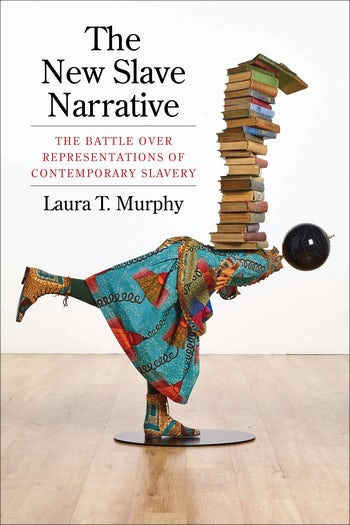
L. T. Murphy, The New Slave Narrative. The Battle Over Representations of Contemporary Slavery
Laura T. Murphy
The New Slave Narrative. The Battle Over Representations of Contemporary Slavery
Columbia University Press
ISBN: 9780231188258
320 p.
30,00 $
A century and a half after the abolition of slavery in the United States, survivors of contemporary forms of enslavement from around the world have revived a powerful tool of the abolitionist movement: first-person narratives of slavery and freedom. Just as Frederick Douglass, Harriet Jacobs, and others used autobiographical testimonies in the fight to eradicate slavery, today’s new slave narrators play a crucial role in shaping an antislavery agenda. Their writings unveil the systemic underpinnings of global slavery while critiquing the precarity of their hard-fought freedom. At the same time, the demands of antislavery organizations, religious groups, and book publishers circumscribe the voices of the enslaved, coopting their narratives in support of alternative agendas.
In this pathbreaking interdisciplinary study, Laura T. Murphy argues that the slave narrative has reemerged as a twenty-first-century genre that has gained new currency in the context of the memoir boom, post-9/11 anti-Islamic sentiment, and conservative family-values politics. She analyzes a diverse range of dozens of book-length accounts of modern slavery from Africa, Asia, the United States, the United Kingdom, and Europe, examining the narrative strategies that survivors of slavery employ to make their experiences legible and to promote a reinvigorated antislavery agenda. By putting these stories into conversation with one another, The New Slave Narrative reveals an emergent survivor-centered counterdiscourse of collaboration and systemic change that offers an urgent critique of the systems that maintain contemporary slavery, as well as of the human rights industry and the antislavery movement.
Laura T. Murphy is professor of human rights and contemporary slavery in the Helena Kennedy Center for International Justice at Sheffield Hallam University and author of Survivors of Slavery: Modern-Day Slave Narratives (Columbia, 2014).
Sommaire
Acknowledgments
A Note on Language
Preface
Introduction: The Reemergence of the Slave Narrative in the Twenty-First Century
1. Making Slavery Legible
2. The Not-Yet-Freedom Narrative
3. Blackface Abolition
4. Sex Problems and Antislavery’s Cognitive Dissonance
5. What the Genre Creates, It Destroys: The Rise and Fall of Somaly Mam
Conclusion: Collegial Reading
Appendix: List of New Slave Narratives
Notes
Bibliography
Index
Reviews
In The New Slave Narrative, Laura T. Murphy, a literary scholar and antislavery activist, provides a timely and rigorous examination of the current narratives of contemporary slavery. Through meticulous readings of these recent volumes, Murphy reveals the profound influence of nineteenth-century slave narratives on these stories, examining how antebellum conventions impact the representations of those who have been recently enslaved. Brilliantly unraveling the political and social milieu in which twenty-first-century slave narratives are produced and published, Murphy makes a convincing argument for a “collegial literary critical approach” in order to “deepen our understanding of slavery and freedom.” The New Slave Narrative is a critically important consideration of human rights discourse.Henry Louis Gates Jr., Alphonse Fletcher University Professor at Harvard University
The New Slave Narrative is an important, foundational text—a book that unstops our ears and opens our minds.Kevin Bales, author of Blood and Earth: Modern Slavery, Ecocide, and the Secret to Saving the World
The New Slave Narrative highlights the centrality of first-person testimony to twenty-first-century efforts to abolish global slavery. By centering autobiographical accounts written by survivors of slavery, Laura T. Murphy attends to how testimonial appeals to distant audiences can reshape human rights discourse and reinvigorate antislavery activism, even as they cannot evade old forms of cooptation. Murphy deftly returns the leadership of antislavery agendas to those who have survived it.Leigh Gilmore, author of Tainted Witness: Why We Doubt What Women Say About Their Lives
Laura T. Murphy's The New Slave Narrative will become the foundational text for a wave of scholars working to understand what these stories mean—for society, for scholarship, and for survivors themselves.Austin Choi-Fitzpatrick, author of What Slaveholders Think: How Contemporary Perpetrators Rationalize What They Do